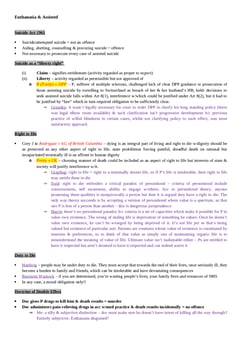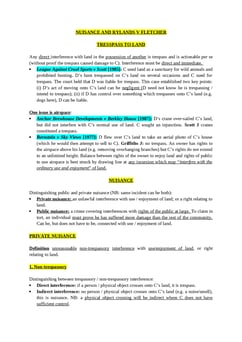Rees v Darlington Memorial Hospital NHS Trust [2003] UKHL 52
Judgement for the case Rees v Darlington Memorial Hospital NHS Trust
Table Of Contents
Plaintiff was blind and wanted a sterilisation, fearing that she would be unable to bring up a child well. The operation was done negligently and she gave birth to a healthy baby.
She sued for the additional costs relating to her own disability that would make it hard for her to bring up a child.
HL (by majority of 4-3) said it would award her a lump sum for the legal wrong that she suffered due to loss of personal autonomy (an addition or “gloss” to McFarlane).
However it denied her any damages relating either to the normal cost of bringing up a healthy child OR the additional costs relating to her own disability.
Majority
Majority uphold that the policy arguments of McFarlane still apply and that a child’s existence shouldn’t be compensated for regardless of a parent’s disability.
Instead, the majority say that the wrong to Plaintiff was the invasion of her autonomy in preventing her choosing not to have children and hence the lump sum was awarded (Lord Bingham describes it as the loss of the ability to plan one’s own life).
Lord Scott: Says that clearly the child was a benefit to her life or she would have got rid of it by abortion or adoption (This kind of reasoning is disapproved in McFarlane).
-
Lord Scott also argues that since McFarlane is already an exception to the general rule of tort liability (in not applying corrective justice), to create an exception to the exception would complicate the law.
(not really: the circumstances of a secondary exception would be quite clear cut, and pursuing fairness is a higher priority than absolute legal clarity+ Parkinson does just this!).
Finally, Lord Millett says that the rearing of a child should not be treated as a cost overall and therefore it isn’t compensable.
-
In CA Waller J (cited with approval by Lord Bingham used distributive justice to support majority in HL: Under McFarlane a woman whose botched sterilisation meant that she had a healthy baby whose existence would cause her a mental breakdown unless help was provided would NOT get compensation.
It would seem inconsistent that a woman with a pre-existing disability should get compensation when the woman whose disability is triggered by the birth would not.
Also why should a woman with a disability get compensation as opposed to an impoverished woman.
Minority
Lord Steyn: The idea of a conventional award is bad - it is arbitrary (legal uncertainty + de facto judicial law-making) and avoids forcing judges to come to sound legal principle.
Lord Hope: says that the equilibrium position is that there is a healthy parent and healthy child, and that if disability related costs of upbringing are recoverable for the child, then why not for the adult? This would be arbitrary and unfair.
(Perhaps it is because in Parkinson Defendant caused the disability, unlike here where the disability was pre-existing. However Parkinson wasn’t decided on the basis of causing a disability but of causing a woman to give birth when she didn’t want to, to a disabled baby. Thus although the distinction would NOT be arbitrary, contrary to Lord Hope, it would be groundless according to case law).
RELATED CASES
For Further Study on Rees v Darlington Memorial Hospital NHS Trust
Need instant answers? Our AI exam tutor is here to help.
Ask questions 🙋 Get answers 📔 It's simple 👁️👄👁️
Our AI is educated by the highest scoring students across all subjects and schools. Join hundreds of your peers today.
Get StartedSimilar Cases
Related Product Samples
These product samples contain the same concepts we cover in this case.
| Medical Law | Medical Negligence Notes (21 pages) |


 Since 2010, Oxbridge Notes has been a trusted education marketplace, supplying high-quality materials from top achievers at universities like Oxford, Cambridge, LSE, Harvard, and Yale.
Since 2010, Oxbridge Notes has been a trusted education marketplace, supplying high-quality materials from top achievers at universities like Oxford, Cambridge, LSE, Harvard, and Yale.